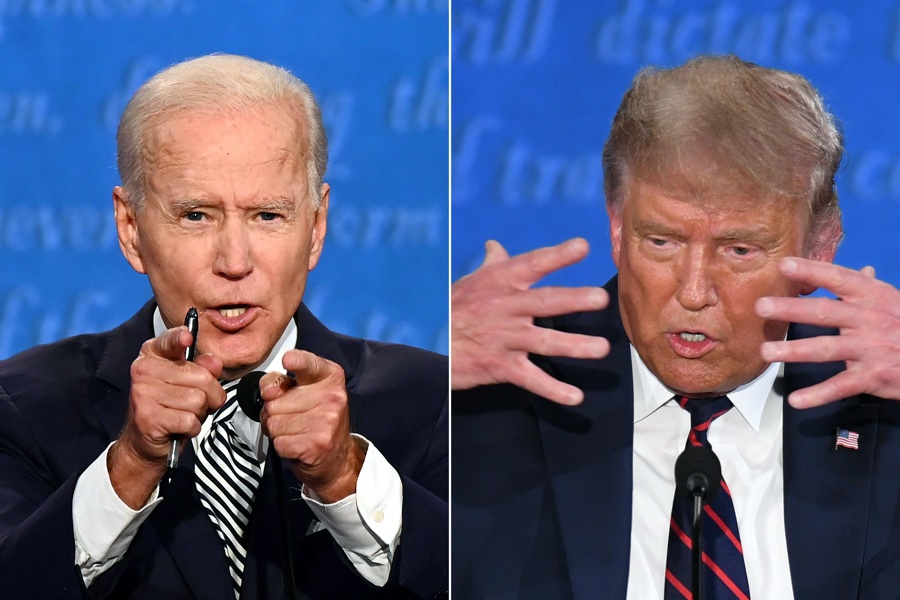Joe Biden and Donald Trump Have Very Different Plans For Your Health Care
A local health policy expert breaks down what each presidential candidate plans to do with the existing health-care law and how it might affect Philadelphians.

Joe Biden and Donald Trump has very different plans for your health care. Photograph by Jim Watson, Saul Loeb/AFP via Getty Images
As the COVID-19 pandemic continues to claim lives around the globe, health care has become a key point of discussion among voters preparing to choose between two candidates for president on November 3rd. But finding the latest information for both candidates’ plans and understanding how each plan might affect you is not as easy as it seems.
For starters, you can’t quite do a side-by-side comparison of Donald Trump and Joe Biden’s health-care policy plans because while Biden’s plan is laid out in great detail here, the latest information about Trump’s impending “America First” plan is only described in brief in a recent executive order here. While the two plans differ, both candidates seem to agree on the importance of lowering prescription drug prices and eliminating surprise billing, though they each have slightly different plans on how it should be done. Central to the candidates’ disagreement is the Affordable Care Act (ACA), the Obama administration health-care law that had a drastic impact on access to health care in Philadelphia, giving thousands of more residents health insurance they otherwise might not have been able to afford. Both Biden and Trump have proposed plans that could either build upon or remove provisions of the ACA.
To make sense of each candidates’ health-care policy plans, we asked David Grande, the Director of Policy at the Leonard Davis Institute of Health Economics at the University of Pennsylvania to help us understand the actions each candidate might take if elected, as it pertains to health care, and how their choices might affect the average Philly resident.
NextHealth PHL: What are some of the key points in Donald Trump’s health-care plan?
Grande: With respect to President Trump, his campaign has not put forward a comprehensive health-care plan. And so, to characterize his plans is more based on looking at positions he has supported in the past, actions that the White House has pushed for, and things that he has said on the campaign trail. But clearly, he has made it a big priority to repeal the Affordable Care Act (ACA) and to roll back many of the provisions of that ACA if the law were not fully repealed. He talks a lot about actions to decrease regulations over insurance companies and remove some of the consumer protections or the requirements for coverage that are part of the ACA. That being said, he strongly speaks out in favor of preserving the protections for preexisting conditions but has not put forward a plan of how to actually achieve that despite wanting to roll back the ACA. So, it makes it very hard to interpret exactly what he would push for in a second term because despite talking about putting forward a comprehensive plan, he has never done that during his first term and certainly has not done it during the campaign. But I think it’s safe to say that rolling back the ACA continues to be a high priority.
And what are some areas Joe Biden focuses on in his health-care plan?
Biden has put forth a plan that is really based around building on the ACA as opposed to some new sweeping overhaul. So, one of the main shortcomings of the ACA is that people who make more than 400 percent of the federal poverty level don’t qualify for subsidies to buy insurance. So, there reaches a point where people struggle to afford the coverage that is available through the ACA. So, he wants to extend subsidies to many more Americans, irrespective of your income. He also wants to make the coverage available through the ACA more generous, meaning lower deductibles and lower copays, because that has also been a challenge with the Affordable Care Act as it exists today. Then, lastly, he wants to create a public option, meaning he wants to have the government provide an insurance option to people when they’re selecting a plan for the ACA.
How would you characterize the overall difference between the two candidates’ plans?
Overall, Joe Biden wants to build on the ACA by making subsidies available to more people and making the coverage more generous for people who get it. And Donald Trump seems to want to roll back the ACA, deregulate insurance, and find some alternative way that he has not described yet, protect preexisting conditions.
Which demographic groups are most likely to be impacted by either of these potential health-care policy changes?
One of the things the Affordable Care Act does is it really helps people who have chronic conditions and people who are over the age of 50, who are more likely to have health-care needs, and it makes that coverage much more affordable for them. I think the population that could really be hurt by rolling back the ACA are people who have any kind of significant chronic health-care needs because if you remove all of those protections, we go back to the way things were before the ACA where people in those situations, if they didn’t have access to coverage through their employer really, couldn’t afford coverage at all or were denied coverage.
Could COVID-19 have an impact on who can get insurance under either of these plans?
Certainly, the last thing we want people to worry about during a pandemic is being unable to afford access to health care. We have many people being displaced from their jobs by the pandemic, and when they’re displaced from their jobs, in many cases, they’re also displaced from their health insurance. So, programs like the ACA are built for these moments where people need somewhere to turn for help. So, the last thing we want to do right now, at this moment in history, when we’re facing one of the biggest public health crisis we’ve ever faced, is to make it harder for people to get covered and make it harder for people to access health care. I think in the long term, we don’t really know if people will have long term health effects from COVID yet. So, I think that raises a whole separate set of questions about whether COVID could become a preexisting condition and how that could impact people’s access to coverage in the future if preexisting conditions weren’t protected.
What should voters be considering about the candidates’ approaches to health care as they prepare to head to the polls?
I think health care is on the top of everyone’s minds right now, and certainly, that would be true in Philadelphia as well. And I think it ought to be an expectation right now during a pandemic that candidates are as specific as possible about what they intend to do. I think one of the things that the president has fallen short of is providing any specifics despite promising to do so many times. So, it makes it very hard for voters to know what his plans would be in a second term and that leaves voters left to guess, and then they just have to look at things he says and things that he has advocated for in the past. That makes it very hard for voters to kind of sift through when candidates are not forthcoming with plans.


